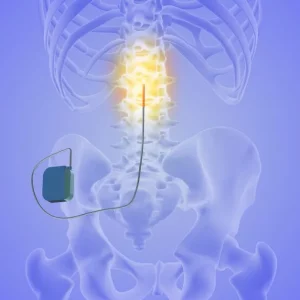Developing a bloated stomach after spinal cord injury can cause survivors and caregivers to grow concerned.
Stomach bloating occurs when there’s gas or water retention in the body. It’s an uncomfortable sensation that can make you feel heavy and may even cause pain.
There are reasons why you may experience more frequent bloating after spinal cord injury.
This article will explain how SCI can contribute to stomach bloating and go over ways to manage it.
What Causes a Bloated Stomach After Spinal Cord Injury?
There are several factors that can cause your stomach to bloat more than usual after a spinal cord injury.
SCIs disrupt communication between your brain and body, which can require significant lifestyle changes due to difficulties moving and feeling.
Some spinal cord injury-related factors that can cause a bloated stomach include:
- Bowel and Bladder Dysfunction. After a spinal cord injury, people may not be able to feel when their bladder or bowel need to be emptied. Additionally, due to lack of muscle control, they may experience difficulties eliminating the waste. This may cause constipation which keeps the waste in the large intestine, and results in bloating.
- Impaired Diaphragm Function. An injury at the upper levels of the spinal cord may affect innervation of the diaphragm. Diaphragm contractions push down on the abdominal cavity, which may increase pressure and contribute to the sensation of bloating.
- Physical Inactivity. An SCI can leave someone wheelchair-bound, which limits their mobility. Lack of physical activity can reduce blood pressure, circulation, and metabolic rate. This can likewise slow down digestion.
- Diet. In addition to reduced physical activity, consuming a diet high in sodium or carbs may cause water retention. Cruciferous vegetables like broccoli, cabbage, and kale are difficult for the body to digest, which contributes to gas and bloating.
- Stress. Your mental health can play a role in the state of your body. High-stress levels increase the release of a hormone called cortisol, which makes you feel hungry. This may cause you to eat more, creating not only bloating of the stomach but also weight gain.
How to Get Rid of a Bloated Stomach After Spinal Cord Injury

Now that you know what may cause a bloated stomach after spinal cord injury, here are suggestions to incorporate into your daily routine to promote healthy digestion and reduce water retention and gas.
1) Increase Physical Activity
When you move frequently, your circulation and metabolic rate increases, which in turn promotes digestion and bowel movements.
Another way to decrease the excess water in your system is to sweat it out. Consider incorporating aerobic exercise into your daily. Any movement of your arms higher than your heart increases circulation and heart rate.
Individuals with restricted mobility can practice passive range of motion exercises with a caregiver to loosen joints and promote blood flow.
Want 15 pages of SCI recovery exercises in PDF form? Click here to download our free SCI Rehab Exercise ebook now (link opens a pop up for uninterrupted reading)
2) Drink More Water
It might sound counterintuitive but drinking more water will not only increase the fluidity of your bowel movements, but it will also remind your body that it does not need to store excess water.
When you’re not drinking enough water, the body will store it because it is unsure when its supply will be replenished.
3) Adjust Your Diet

Because limited mobility can cause your digestion to slow, making healthy changes in your diet may be beneficial.
Reducing sodium and carbohydrate intake generally reduces water retention.
While high-fiber foods are ideal for adding bulk to your stool and promoting bowel movements, they can also contribute to abdominal bloating.
Consuming additional fiber may cause digestive problems. Start small and gradually increase fiber intake over time so that your body can get accustomed to digesting it.
4) Follow a Bowel Management Program
A bowel management program will help you keep track of your bowel patterns.
By following a schedule, you’ll ensure regular bowel emptying and avoid blockage that can cause bloating.
Because many SCI patients cannot control muscle contractions in this area, they may need to take medications or require manual stimulation.
Spinal Cord Injury and Stomach Bloating
If bloating does not subside, consult with a doctor. While mild bloating after a meal is completely normal, bloating that does not go away or causes pain can be indicative of a more serious problem.
Hopefully, this article helped you understand why you may be experiencing more frequent stomach bloating after spinal cord injury and what you can do to manage it.










